One thing I’ve noticed about being a soundtrack collector is that I own many film scores from bad and/or long-forgotten movies. I was thinking about this while contributing to Popdose’s recent tribute to film composer Alan Silvestri in which I mentioned that a particularly fun score for me was Judge Dredd (1995), which most people would agree is not the most inspiring of sources. And so for the purposes of this list, it seems like a good place to start.
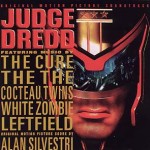 Judge Dredd (1995, composed by Alan Silvestri). I have to wonder what exactly Silvestri saw in this film to write such impressive music. It makes me wonder what goes on when a composer sits down to write music for what he knows is a bad film. Does the composer latch onto something, anything, about the film that works — in this case perhaps the film’s lavish production design? Or does the composer focus entirely on the things that don’t work, in an effort to bring those elements out more with the right music? Is there perhaps an extra level of pressure because the composer will need to work twice as hard to make the audience feel like they’re watching something incredibly epic? Whatever the answer, all I know is I like to play this cue a lot.
Judge Dredd (1995, composed by Alan Silvestri). I have to wonder what exactly Silvestri saw in this film to write such impressive music. It makes me wonder what goes on when a composer sits down to write music for what he knows is a bad film. Does the composer latch onto something, anything, about the film that works — in this case perhaps the film’s lavish production design? Or does the composer focus entirely on the things that don’t work, in an effort to bring those elements out more with the right music? Is there perhaps an extra level of pressure because the composer will need to work twice as hard to make the audience feel like they’re watching something incredibly epic? Whatever the answer, all I know is I like to play this cue a lot.
Judge Dredd – Block War
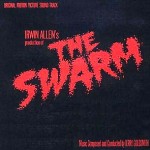 The Swarm (1978, composed by Jerry Goldsmith). While Goldsmith has scored some classic cinema such as Patton (1970) and Chinatown (1974), he’s also lent his talents to quite a few stinkers too — like this one. For Irwin Allen’s big-screen killer bee invasion flick, Goldsmith writes one of the busiest and most exciting scores of his career, while at the same time acknowledging he’s not taking things completely serious by using the notes B E E for one of the main motifs. You’ll hear that motif in this incredible cue, written for a mostly laughable scene in which the bees descend upon the small town of Marysville.
The Swarm (1978, composed by Jerry Goldsmith). While Goldsmith has scored some classic cinema such as Patton (1970) and Chinatown (1974), he’s also lent his talents to quite a few stinkers too — like this one. For Irwin Allen’s big-screen killer bee invasion flick, Goldsmith writes one of the busiest and most exciting scores of his career, while at the same time acknowledging he’s not taking things completely serious by using the notes B E E for one of the main motifs. You’ll hear that motif in this incredible cue, written for a mostly laughable scene in which the bees descend upon the small town of Marysville.
Swarm – The Bees Arrive
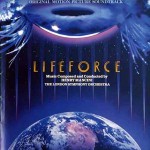 Lifeforce (1985, composed by Henry Mancini). I suppose one could argue that Lifeforce isn’t really a “bad” movie because it has it’s share of campy fun and takes the term “gratuitous nudity” to new levels. I watched the restored version a few years back and enjoyed it ever-so-slightly more than the mess I remember seeing in theaters. But it’s still pretty bad. At least the restored version contains more of Mancini’s score, which is definitely a better score than the movie deserves. What kind of world are we living in where Henry Mancini had gone from scoring important films like Breakfast at Tiffany’s and Days of Wine and Roses in the ’60s to scoring a Cannon film in the ’80s? Whatever the reason, I’m happy it happened because the end result is a score that I’ve played about a hundred times more than either of those more important works. The following cue was written for a scene in which a nude Steve Railsback impales both himself and Mathilda May (who is naked for pretty much the whole movie) with a sword. Enjoy.
Lifeforce (1985, composed by Henry Mancini). I suppose one could argue that Lifeforce isn’t really a “bad” movie because it has it’s share of campy fun and takes the term “gratuitous nudity” to new levels. I watched the restored version a few years back and enjoyed it ever-so-slightly more than the mess I remember seeing in theaters. But it’s still pretty bad. At least the restored version contains more of Mancini’s score, which is definitely a better score than the movie deserves. What kind of world are we living in where Henry Mancini had gone from scoring important films like Breakfast at Tiffany’s and Days of Wine and Roses in the ’60s to scoring a Cannon film in the ’80s? Whatever the reason, I’m happy it happened because the end result is a score that I’ve played about a hundred times more than either of those more important works. The following cue was written for a scene in which a nude Steve Railsback impales both himself and Mathilda May (who is naked for pretty much the whole movie) with a sword. Enjoy.
Lifeforce – The Web of Destiny Suite Part III
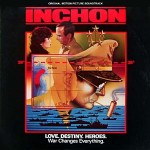 Inchon (1981, composed by Jerry Goldsmith). Laurence Olivier stars as General Douglas MacArthur in this account of the Battle of Inchon during the Korean War. While the film has largely been forgotten, the one memorable aspect was that the production was financed by Unification Church founder Sun Myung Moon. Legend has it that at the recording sessions, Goldsmith was paid for his services in cash from a brown paper bag. I’m not sure what more can be said, except that the composer delivered a score worthy of a much better movie.
Inchon (1981, composed by Jerry Goldsmith). Laurence Olivier stars as General Douglas MacArthur in this account of the Battle of Inchon during the Korean War. While the film has largely been forgotten, the one memorable aspect was that the production was financed by Unification Church founder Sun Myung Moon. Legend has it that at the recording sessions, Goldsmith was paid for his services in cash from a brown paper bag. I’m not sure what more can be said, except that the composer delivered a score worthy of a much better movie.
Inchon – Main Title
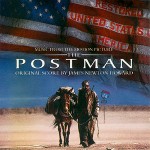 The Postman (1997, composed by James Newton Howard). A post-apocalyptic setting is generally a great opportunity for a composer and here Howard writes a score that at times has understated beauty but also has some epic action music with a stirring main theme. Unfortunately Kevin Costner’s telling of the 1985 science fiction novel by David Brin (loosely adapted by Eric Roth and Brian Helgeland) was not at all well-received by either critics or audiences. The film tanked, Howard’s excellent score headed quickly to the cut-out bins, and it was the other postman score that ended up winning an Oscar — Luis Bacalov’s Il Postino (1994) — but that one’s not even in my library. One of the joys of writing this article was rediscovering Howard’s score, an old friend I hadn’t heard from in a while.
The Postman (1997, composed by James Newton Howard). A post-apocalyptic setting is generally a great opportunity for a composer and here Howard writes a score that at times has understated beauty but also has some epic action music with a stirring main theme. Unfortunately Kevin Costner’s telling of the 1985 science fiction novel by David Brin (loosely adapted by Eric Roth and Brian Helgeland) was not at all well-received by either critics or audiences. The film tanked, Howard’s excellent score headed quickly to the cut-out bins, and it was the other postman score that ended up winning an Oscar — Luis Bacalov’s Il Postino (1994) — but that one’s not even in my library. One of the joys of writing this article was rediscovering Howard’s score, an old friend I hadn’t heard from in a while.
Postman – The Restored United States
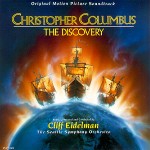 Christopher Columbus: The Discovery (1992, composed by Cliff Eidelman). Alexander and Ilya Salkind produced this attempt of telling the events that lead to Christopher Columbus’s 1492 voyage. It was a box-office flop that was generally slammed by critics and the troubled production would prove so frustrating that it would be the last film produced by the father and son Salkind team (who are also responsible for the next film on this list). But despite the film’s shortcomings, composer Cliff Eidelman, who received his big break by landing the scoring assignment for Star Trek VI: The Undiscovered Country (1991), delivers a sweeping, passionate, epic score.
Christopher Columbus: The Discovery (1992, composed by Cliff Eidelman). Alexander and Ilya Salkind produced this attempt of telling the events that lead to Christopher Columbus’s 1492 voyage. It was a box-office flop that was generally slammed by critics and the troubled production would prove so frustrating that it would be the last film produced by the father and son Salkind team (who are also responsible for the next film on this list). But despite the film’s shortcomings, composer Cliff Eidelman, who received his big break by landing the scoring assignment for Star Trek VI: The Undiscovered Country (1991), delivers a sweeping, passionate, epic score.
Christoper Columbus – A Hero’s Welcome (Epilogue)
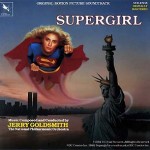 Supergirl (1984, composed by Jerry Goldsmith). It’s pretty obvious that as a film composer, Goldsmith pretty much never phoned it in — some of my favorite scores of his come from mediocre films. In this example, a tractor somehow comes to life and starts wreaking havoc. I have no memory of how or why this happens and wasn’t about to re-watch any of the movie for this article, but I think it was something to do with Faye Dunaway using magic powers from an amulet. It’s a stupid scene, yet Goldsmith writes a ferocious action cue, which makes me think that writing this kind of busy orchestral music must have simply been fun for him, regardless of the inspiration. Or lack thereof.
Supergirl (1984, composed by Jerry Goldsmith). It’s pretty obvious that as a film composer, Goldsmith pretty much never phoned it in — some of my favorite scores of his come from mediocre films. In this example, a tractor somehow comes to life and starts wreaking havoc. I have no memory of how or why this happens and wasn’t about to re-watch any of the movie for this article, but I think it was something to do with Faye Dunaway using magic powers from an amulet. It’s a stupid scene, yet Goldsmith writes a ferocious action cue, which makes me think that writing this kind of busy orchestral music must have simply been fun for him, regardless of the inspiration. Or lack thereof.
Supergirl – The Monster Tractor
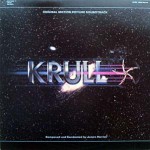 Krull (1983, composed by James Horner). Long before he won his Oscar for Titanic (1997), Horner wrote what I consider to be the most exciting adventure score of his career for a very bad fantasy film that (poorly) attempts to combine swords with some kind of laser weapons. When a composer is just starting out, getting a gig like this — a fantasy film with a music budget big enough for a large orchestra and chorus — is a pretty big deal. No matter how bad the film is, it’s an opportunity to show people what you can do. But you’re sure not going to get any Oscar nominations. The music cue here is written for a scene in which our heroes ride Fire Mares, horses that are so fast they leave a fire trail behind them on the ground. It’s one of the few scenes in the movie that kind of works — until the horses inexplicably take flight and the fire trail somehow follows them into the air. Whatever, dudes.
Krull (1983, composed by James Horner). Long before he won his Oscar for Titanic (1997), Horner wrote what I consider to be the most exciting adventure score of his career for a very bad fantasy film that (poorly) attempts to combine swords with some kind of laser weapons. When a composer is just starting out, getting a gig like this — a fantasy film with a music budget big enough for a large orchestra and chorus — is a pretty big deal. No matter how bad the film is, it’s an opportunity to show people what you can do. But you’re sure not going to get any Oscar nominations. The music cue here is written for a scene in which our heroes ride Fire Mares, horses that are so fast they leave a fire trail behind them on the ground. It’s one of the few scenes in the movie that kind of works — until the horses inexplicably take flight and the fire trail somehow follows them into the air. Whatever, dudes.
Krull – Ride Of The Firemares
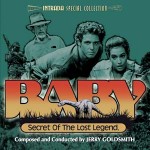 Baby: Secret of the Lost Legend (1985, composed by Jerry Goldsmith). At the risk of having this list be a tad Goldsmith-heavy, I’ll leave you with an amazing action cue from this Disney flop about a family of brontosaurs discovered in Africa. It’s an interesting premise marred by bad everything — except, of course, the music. It’s hard to believe this was produced by Roger Spottiswoode, the director of Under Fire (1983, which was also scored by Goldsmith). The composer’s usual shifting time signatures are at work here, punctuated by an awesome moment where the orchestra drops out completely and the percussion takes over for a couple of measures.
Baby: Secret of the Lost Legend (1985, composed by Jerry Goldsmith). At the risk of having this list be a tad Goldsmith-heavy, I’ll leave you with an amazing action cue from this Disney flop about a family of brontosaurs discovered in Africa. It’s an interesting premise marred by bad everything — except, of course, the music. It’s hard to believe this was produced by Roger Spottiswoode, the director of Under Fire (1983, which was also scored by Goldsmith). The composer’s usual shifting time signatures are at work here, punctuated by an awesome moment where the orchestra drops out completely and the percussion takes over for a couple of measures.
Baby – The Rescue
Related articles
- The Composers: Alan Silvestri (popdose.com)
- The Composers: Jerry Goldsmith (popdose.com)
- Composer Alan Silvestri Tapped to Score CAPTAIN AMERICA: THE FIRST AVENGER (collider.com)
- The Composers: John Williams (popdose.com)
- Revival House: “You talkin’ to me?” (popdose.com)





Comments